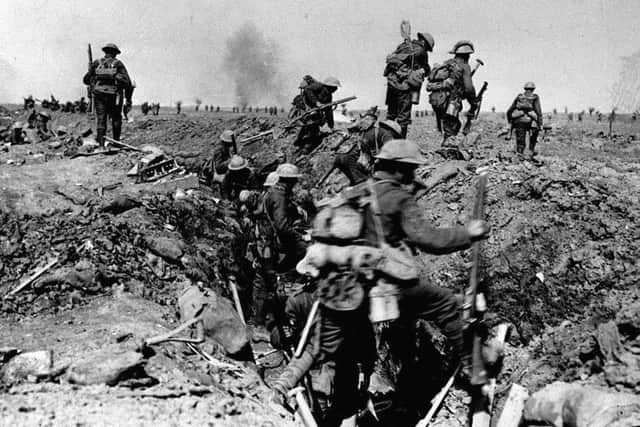Armistice 100. Words of War poet will never die
He had fallen on the Western Front just a week before the Armistice was signed, while attempting to lead his men across a canal at Ors, into full range of enemy fire. A month previously he had been awarded the Military Cross for bravery.
Although only five poems were published in his lifetime, Wilfred Owen’s body of war poetry (or rather, anti-war poetry) was later judged to be the most important and poignant of the First World War.
And his stature has only grown over time.
Advertisement
Hide AdAdvertisement
Hide Ad

Poems such as Anthem For Doomed Youth, Exposure and Dulce et Decorum Est gave the lie to the upbeat propaganda designed to swell Kitchener’s Army by showing smart and happy soldiers appealing to other men to do the right thing.
Owen’s poetry ran contrary to the ‘war is glorious’ message of early First World War works and government recruitment campaigns; he set out to show the true horrors of trench warfare and the bloody, unnecessary loss of young lives.
From a fairly impoverished Shropshire family, Owen – who had been writing poetry since the age of 11 – had worked as a vicar’s assistant then taught English in France, but returned to England in 1915 to enlist.
In early 1917, he was blown up into the air by a trench mortar and, after several days unconscious amongst the remains of a fellow officer, was sent to Craiglockhart Hospital in Edinburgh suffering shell shock. While there he met the celebrated anti-war poet Siegfried Sassoon, who offered to edit Owen’s work.
Advertisement
Hide AdAdvertisement
Hide AdThere then followed five months in Scarborough (which had suffered two major enemy bombardments), where Owen’s regiment, The Manchester, took on coastal guard duties. The young poet refined many major works in his turret room at the Clarence Gardens Hotel.
But, despite the state of his nerves, by September 1918 there was fear of a German counter-attack and after a period of preparation in Ripon, Owen was back at the Front.
We can only speculate about the state of his emotions as he sat in Ripon Cathedral on the day of his 25th birthday in 1918.
He was contemplating return to the place that had caused him to lose his mind, a place he regarded as “hell”.
Advertisement
Hide AdAdvertisement
Hide AdOwen’s coruscating and ironic Dulce et Decorum Est is studied by 15 and 16-year-olds as part of a GCSE poetry anthology featuring several war poems offering different opinions of the Great War and more recent warfare.
But it is Owen’s ‘gas poem’, this devastating eye witness account of one comrade (emblematic of thousands more) dying from mustard gas poisoning, which seems to burn itself into the imagination most, and bring tears of shock to even the coolest student.
While the received message was that it was ‘sweet and right’ to die for your country, Owen begged to differ, referring to the Latin slogan as “the old lie”
He saw young men dehumanised, floundering in mud and “blood shod”. One poor unfortunate was “drowning” in green gas, frothing at the mouth and writhing in death throes.
What is ‘sweet and right’ surely is that Owen’s poetry – which could not save his own generation – reaches the minds of a young audience, today and in the future.